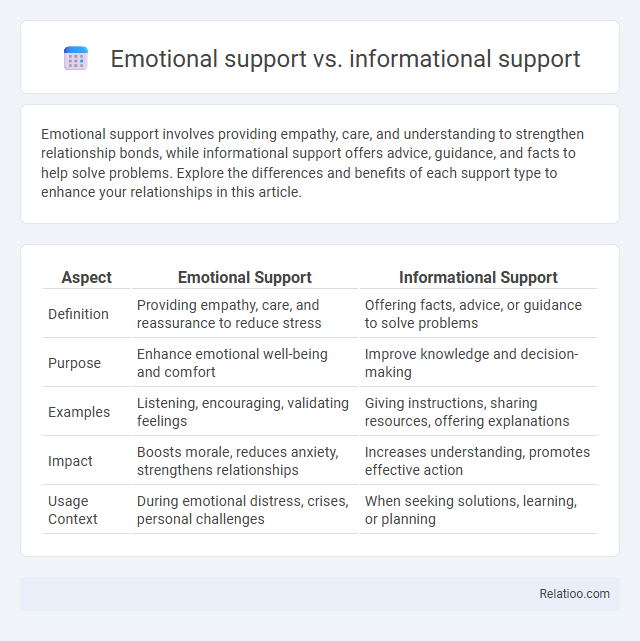Emotional support involves providing empathy, care, and understanding to strengthen relationship bonds, while informational support offers advice, guidance, and facts to help solve problems. Explore the differences and benefits of each support type to enhance your relationships in this article.
Table of Comparison
| Aspect | Emotional Support | Informational Support |
|---|---|---|
| Definition | Providing empathy, care, and reassurance to reduce stress | Offering facts, advice, or guidance to solve problems |
| Purpose | Enhance emotional well-being and comfort | Improve knowledge and decision-making |
| Examples | Listening, encouraging, validating feelings | Giving instructions, sharing resources, offering explanations |
| Impact | Boosts morale, reduces anxiety, strengthens relationships | Increases understanding, promotes effective action |
| Usage Context | During emotional distress, crises, personal challenges | When seeking solutions, learning, or planning |
Understanding Emotional Support
Emotional support involves providing empathy, care, and reassurance to help individuals cope with stress and emotional challenges, fostering a sense of belonging and validation. Informational support offers advice, guidance, and useful data to assist problem-solving and decision-making processes during difficulties. Support seeking is the active process of reaching out to others to obtain emotional comfort or practical assistance, crucial for resilience and mental well-being.
Defining Informational Support
Informational support involves providing guidance, advice, or knowledge to help someone solve problems or make decisions, making it a critical component of effective social support networks. Your ability to offer accurate information or resources directly influences how well individuals can navigate challenges or find solutions. Emotional support focuses on empathy and reassurance, while support seeking is the proactive step of asking for help in times of need.
Key Differences between Emotional and Informational Support
Emotional support involves offering empathy, care, and reassurance to help you manage feelings and reduce stress, while informational support provides practical advice, guidance, or facts to address specific problems. The key difference lies in emotional support targeting psychological well-being, whereas informational support focuses on problem-solving and knowledge sharing. Support seeking involves actively reaching out to others for either type of assistance based on your needs.
Psychological Impact of Emotional Support
Emotional support significantly enhances psychological well-being by reducing feelings of stress, anxiety, and depression through empathy, care, and validation. This form of support activates neural pathways linked to emotional regulation, fostering resilience and improved mental health outcomes. Unlike informational support or support seeking, emotional support directly affects mood stabilization and strengthens interpersonal relationships, which are crucial for long-term psychological stability.
Cognitive Benefits of Informational Support
Informational support provides cognitive benefits by offering relevant knowledge, guidance, and problem-solving strategies that enhance understanding and decision-making. This form of support helps individuals process information more effectively, leading to improved learning and adaptive coping mechanisms. Unlike emotional support, which addresses feelings, informational support directly contributes to cognitive growth and skill development.
Situations Where Emotional Support is Essential
Emotional support is essential during situations involving grief, trauma, or intense stress, where empathy and understanding help regulate your emotions and foster resilience. Unlike informational support, which provides facts and guidance, emotional support focuses on validating feelings and offering comfort, making it crucial for mental well-being in crisis contexts. Support seeking in these moments often involves reaching out to trusted individuals who can provide a safe space for emotional expression and encouragement.
When to Provide Informational Support
Provide informational support when individuals face complex problems requiring clear guidance or factual knowledge, such as during decision-making or problem-solving scenarios. This type of support enhances understanding, enabling informed choices and practical solutions. Avoid overwhelming recipients with excessive data; tailor information to their needs and readiness to ensure effective assistance.
Combining Emotional and Informational Support Effectively
Combining emotional and informational support effectively enhances your ability to address both psychological and practical needs, fostering resilience and informed decision-making. Emotional support provides empathy and reassurance, while informational support offers guidance and knowledge, creating a balanced approach to coping with challenges. Integrating these supports encourages open communication and strengthens problem-solving skills, leading to improved overall well-being.
Challenges in Balancing Support Types
Balancing emotional support, informational support, and support seeking presents challenges due to differing individual needs and contextual factors. Emotional support relies on empathy and validation, while informational support demands accuracy and relevance, creating potential conflicts when both are sought simultaneously. Navigating these support types requires careful communication to avoid misunderstandings and ensure effective assistance tailored to unique psychological states.
Enhancing Social Relationships through Support
Emotional support, informational support, and support seeking play distinct yet complementary roles in enhancing social relationships by fostering trust, understanding, and effective communication. Emotional support involves empathy and encouragement that strengthen personal bonds, while informational support provides valuable advice and guidance that clarify uncertainties and empower decision-making. Support seeking activates these exchanges, promoting reciprocal interactions that deepen connection and resilience in social networks.

Infographic: Emotional support vs Informational support
 relatioo.com
relatioo.com